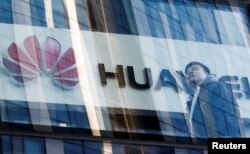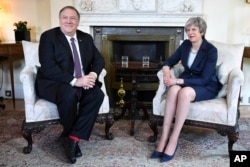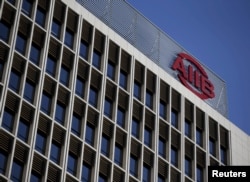May 09, 2019 at 06:19AM
Britain is eager to negotiate trade deals with the United States and China to compensate for leaving the European Union, by far the country's largest trading partner, but it is already discovering the snag of balancing geo-political requests of its traditional ally with the ambitions of Beijing, say analysts and diplomats.
Beijing hopes a trade deal will not only make Britain a secure base for Chinese companies looking to enhance their global brand value and make new acquisitions, but will lead to the British becoming advocates within the West for China's interests, say China-watchers.
Beijing has "high hopes of the UK acting as a cheerleader for China's global ambitions," according to Yu Jie of Britain's Chatham House. But cheerleading for China will come at the expense of its traditional alliance with the United States.
Lure of Huawei
The transatlantic spat over whether Britain should allow the Chinese technology giant Huawei to build parts of Britain's fifth-generation (5G) mobile network is a preview of Britain's post-Brexit dilemma.
Chinese technology and investment already looks alluring enough for a Britain desperate to fashion post-Brexit trade deals to disregard U.S. security alarm over Huawei and to place short-term commercial gain ahead of its established diplomatic relations with the United States.
Washington fears the Chinese telecoms giant will act as a Trojan horse for China's espionage agencies, allowing them to sweep up data and gather intelligence, compromising not only Britain's security, but also America's, say U.S. officials.
U.S. Secretary of State Mike Pompeo reiterated Washington's alarm in meetings Wednesday with Prime Minister Theresa May and British Foreign Secretary Jeremy Hunt in London. Pompeo has warned Western allies to shun Huawei or risk losing intelligence-sharing arrangements with Washington. U.S. officials say a failure to reverse the decision will harm Britain's much vaunted special relationship with America.
The United States has blocked Huawei from government communication systems, but Washington has not yet banned Chinese telecommunications gear from civilian networks. That's partly because some American carriers in rural areas already use Huawei equipment.
May provisionally gave the go-ahead last month for the Chinese tech giant's involvement in developing the 5G network. She did so in the face of opposition from her security and foreign ministers, amid the dire U.S. warnings.
A White House official told VOA the issue will likely be raised during U.S. President Donald Trump's state visit next month to Britain.
Australia and New Zealand have decided to block or heavily restrict using Huawei's technology in developing their 5G networks.
Huawei denies being controlled by the Chinese government and says its equipment can't be used for espionage.
British officials dismiss claims May's decision was made in Britain's search for post-Brexit trade deals.
But critics say if Britain is going to strike a trade deal with China after leaving the European Union, Huawei will likely play a major role and London could ill-afford to offend Beijing by blocking the telecom giant. Huawei, one of China's biggest exporters, has pledged to spend $4 billion on British products and services.
The critics worry the Huawei decision is part of the pattern of a Chinese government that attaches political strings to commercial deals.
'Easy prey for Beijing'
A post-Brexit Britain will be "easy prey for Beijing," fears Ed Lucas, a commentator for Britain's The Times newspaper. He argues London will be in a position of weakness in negotiating bilateral trade deals and there is a high risk of a "hard-pressed and isolated Britain being bossed around by China's Communist Party."
"On most fronts, Britain is already quite prepared to grovel," he said, pointing to the visit last month of Britain's finance minister, Philip Hammond, to a conference in China.
In Beijing, Hammond praised the "truly epic ambition" of China's Belt and Road Initiative, a massive trillion-dollar trade, investment and infrastructure program launched in 2015 to spur trade along land and sea routes linking Asia, Africa and Europe, that is prompting Western concern. The European Union last month dubbed China a "systemic rival."
Britain's previous Conservative government also looked toward China for commercial deals. Hard-pressed from the fallout of the 2008 financial crash, it too was attracted by Chinese investment, and in 2013 became the first Western country to join the Asian Infrastructure Investment Bank.
The move was condemned by the administration of then-U.S. President Barack Obama, with a senior U.S. official complaining to the London-based Financial Times about Britain's failure to maintain a united front and its "constant accommodation" of China.
As Britain re-thinks its place in the world, it appears to be hedging its bets when it comes to choosing between Washington and Beijing, says Jonathan Shaw, the former head of cybersecurity at Britain's defense ministry, a critic of May's Huawei decision. "We are facing a new technological Cold War between China and America, and America has asked us to choose," he told a London radio program.

Britain is eager to negotiate trade deals with the United States and China to compensate for leaving the European Union, by far the country's largest trading partner, but it is already discovering the snag of balancing geo-political requests of its traditional ally with the ambitions of Beijing, say analysts and diplomats.
Beijing hopes a trade deal will not only make Britain a secure base for Chinese companies looking to enhance their global brand value and make new acquisitions, but will lead to the British becoming advocates within the West for China's interests, say China-watchers.
Beijing has "high hopes of the UK acting as a cheerleader for China's global ambitions," according to Yu Jie of Britain's Chatham House. But cheerleading for China will come at the expense of its traditional alliance with the United States.
Lure of Huawei
The transatlantic spat over whether Britain should allow the Chinese technology giant Huawei to build parts of Britain's fifth-generation (5G) mobile network is a preview of Britain's post-Brexit dilemma.
Chinese technology and investment already looks alluring enough for a Britain desperate to fashion post-Brexit trade deals to disregard U.S. security alarm over Huawei and to place short-term commercial gain ahead of its established diplomatic relations with the United States.
Washington fears the Chinese telecoms giant will act as a Trojan horse for China's espionage agencies, allowing them to sweep up data and gather intelligence, compromising not only Britain's security, but also America's, say U.S. officials.
U.S. Secretary of State Mike Pompeo reiterated Washington's alarm in meetings Wednesday with Prime Minister Theresa May and British Foreign Secretary Jeremy Hunt in London. Pompeo has warned Western allies to shun Huawei or risk losing intelligence-sharing arrangements with Washington. U.S. officials say a failure to reverse the decision will harm Britain's much vaunted special relationship with America.
The United States has blocked Huawei from government communication systems, but Washington has not yet banned Chinese telecommunications gear from civilian networks. That's partly because some American carriers in rural areas already use Huawei equipment.
May provisionally gave the go-ahead last month for the Chinese tech giant's involvement in developing the 5G network. She did so in the face of opposition from her security and foreign ministers, amid the dire U.S. warnings.
A White House official told VOA the issue will likely be raised during U.S. President Donald Trump's state visit next month to Britain.
Australia and New Zealand have decided to block or heavily restrict using Huawei's technology in developing their 5G networks.
Huawei denies being controlled by the Chinese government and says its equipment can't be used for espionage.
British officials dismiss claims May's decision was made in Britain's search for post-Brexit trade deals.
But critics say if Britain is going to strike a trade deal with China after leaving the European Union, Huawei will likely play a major role and London could ill-afford to offend Beijing by blocking the telecom giant. Huawei, one of China's biggest exporters, has pledged to spend $4 billion on British products and services.
The critics worry the Huawei decision is part of the pattern of a Chinese government that attaches political strings to commercial deals.
'Easy prey for Beijing'
A post-Brexit Britain will be "easy prey for Beijing," fears Ed Lucas, a commentator for Britain's The Times newspaper. He argues London will be in a position of weakness in negotiating bilateral trade deals and there is a high risk of a "hard-pressed and isolated Britain being bossed around by China's Communist Party."
"On most fronts, Britain is already quite prepared to grovel," he said, pointing to the visit last month of Britain's finance minister, Philip Hammond, to a conference in China.
In Beijing, Hammond praised the "truly epic ambition" of China's Belt and Road Initiative, a massive trillion-dollar trade, investment and infrastructure program launched in 2015 to spur trade along land and sea routes linking Asia, Africa and Europe, that is prompting Western concern. The European Union last month dubbed China a "systemic rival."
Britain's previous Conservative government also looked toward China for commercial deals. Hard-pressed from the fallout of the 2008 financial crash, it too was attracted by Chinese investment, and in 2013 became the first Western country to join the Asian Infrastructure Investment Bank.
The move was condemned by the administration of then-U.S. President Barack Obama, with a senior U.S. official complaining to the London-based Financial Times about Britain's failure to maintain a united front and its "constant accommodation" of China.
As Britain re-thinks its place in the world, it appears to be hedging its bets when it comes to choosing between Washington and Beijing, says Jonathan Shaw, the former head of cybersecurity at Britain's defense ministry, a critic of May's Huawei decision. "We are facing a new technological Cold War between China and America, and America has asked us to choose," he told a London radio program.




